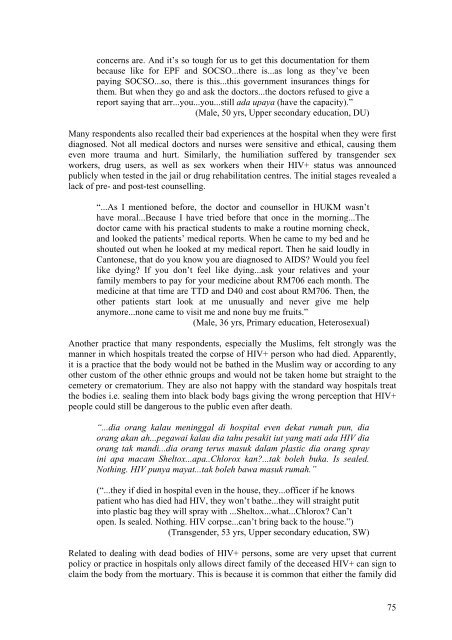Download this publication - AIDS Data Hub
Download this publication - AIDS Data Hub
Download this publication - AIDS Data Hub
You also want an ePaper? Increase the reach of your titles
YUMPU automatically turns print PDFs into web optimized ePapers that Google loves.
concerns are. And it’s so tough for us to get <strong>this</strong> documentation for thembecause like for EPF and SOCSO...there is...as long as they’ve beenpaying SOCSO...so, there is <strong>this</strong>...<strong>this</strong> government insurances things forthem. But when they go and ask the doctors...the doctors refused to give areport saying that arr...you...you...still ada upaya (have the capacity).”(Male, 50 yrs, Upper secondary education, DU)Many respondents also recalled their bad experiences at the hospital when they were firstdiagnosed. Not all medical doctors and nurses were sensitive and ethical, causing themeven more trauma and hurt. Similarly, the humiliation suffered by transgender sexworkers, drug users, as well as sex workers when their HIV+ status was announcedpublicly when tested in the jail or drug rehabilitation centres. The initial stages revealed alack of pre- and post-test counselling.“...As I mentioned before, the doctor and counsellor in HUKM wasn’thave moral...Because I have tried before that once in the morning...Thedoctor came with his practical students to make a routine morning check,and looked the patients’ medical reports. When he came to my bed and heshouted out when he looked at my medical report. Then he said loudly inCantonese, that do you know you are diagnosed to <strong>AIDS</strong>? Would you feellike dying? If you don’t feel like dying...ask your relatives and yourfamily members to pay for your medicine about RM706 each month. Themedicine at that time are TTD and D40 and cost about RM706. Then, theother patients start look at me unusually and never give me helpanymore...none came to visit me and none buy me fruits.”(Male, 36 yrs, Primary education, Heterosexual)Another practice that many respondents, especially the Muslims, felt strongly was themanner in which hospitals treated the corpse of HIV+ person who had died. Apparently,it is a practice that the body would not be bathed in the Muslim way or according to anyother custom of the other ethnic groups and would not be taken home but straight to thecemetery or crematorium. They are also not happy with the standard way hospitals treatthe bodies i.e. sealing them into black body bags giving the wrong perception that HIV+people could still be dangerous to the public even after death.“...dia orang kalau meninggal di hospital even dekat rumah pun, diaorang akan ah...pegawai kalau dia tahu pesakit iut yang mati ada HIV diaorang tak mandi...dia orang terus masuk dalam plastic dia orang sprayini apa macam Sheltox...apa..Chlorox kan?...tak boleh buka. Is sealed.Nothing. HIV punya mayat...tak boleh bawa masuk rumah.”(“...they if died in hospital even in the house, they...officer if he knowspatient who has died had HIV, they won’t bathe...they will straight putitinto plastic bag they will spray with ...Sheltox...what...Chlorox? Can’topen. Is sealed. Nothing. HIV corpse...can’t bring back to the house.”)(Transgender, 53 yrs, Upper secondary education, SW)Related to dealing with dead bodies of HIV+ persons, some are very upset that currentpolicy or practice in hospitals only allows direct family of the deceased HIV+ can sign toclaim the body from the mortuary. This is because it is common that either the family did75















